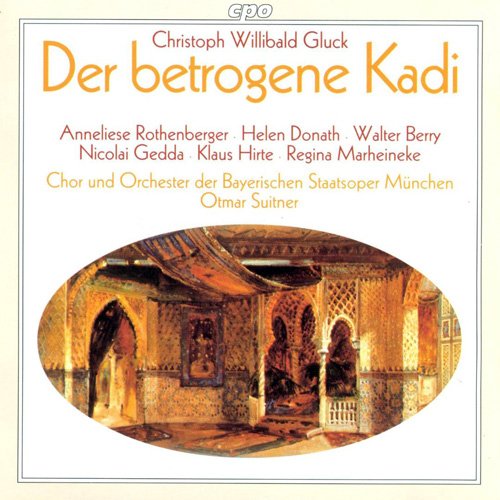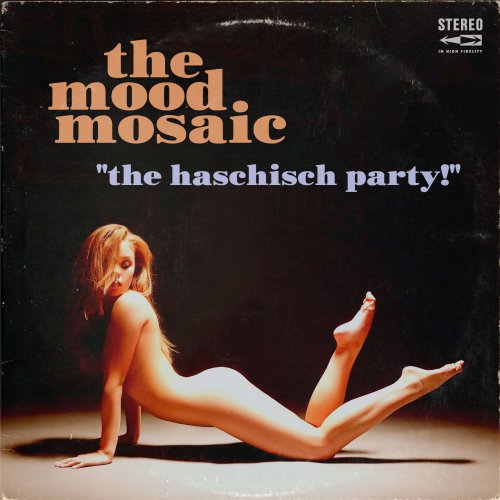Otmar Suitner - Gluck: Der betrogene Kadi

Artist: Otmar Suitner
Title: Gluck: Der betrogene Kadi
Year Of Release: 1998 / 2012
Label: CPO / Warner Classics
Genre: Classical
Quality: FLAC (image + .cue, log, artwork)
Total Time: 49:03 min
Total Size: 247 MB
WebSite: Album Preview
Tracklist:Title: Gluck: Der betrogene Kadi
Year Of Release: 1998 / 2012
Label: CPO / Warner Classics
Genre: Classical
Quality: FLAC (image + .cue, log, artwork)
Total Time: 49:03 min
Total Size: 247 MB
WebSite: Album Preview
01. Overture
02. Ach, wie sind wir zu beklagen
03. Dialogue
04. Teure, lasse dich erflehen
05. Dialogue
06. Welch ein subes Gluck fur mich
07. Dialogue
08. Du, der ich mich geweihet
09. Dialogue
10. Herr Kadi, was dunkt Sie von mir?
11. Dialogue
12. O seliger Tag fur mich
13. Dialogue
14. Macht mein Weib mir sauer Mienen
15. Dialogue
16. Ach leider, muu ich's klagen
17. Dialogue
18. O, du mein Trauter
19. Dialogue
20. Treuloses Herz, Verfuhrer
21. Dialogue
22. Ist dein Herz nicht mein?
23. Dialogue
24. Du spottest meiner?
25. Dialogue Listen
26. Sie wollen andre hintergehen
27. Dialogue
28. Lebe wohl, geliebter Mann
29. Dialogue
30. Dab wir zu nachgebend uns bezeugen
31. Ungeteilt reine Liebe zu schmecken
Otmar Suitner was archetypical of the type of Central European conductor who comes up through the ranks (i.e., opera house, theater, or if an instrumentalist, house orchestra) and worked his way up to leadership by dint of musicality. Some move on to what is essentially international "stardom," such as the case with Karajan or Klemperer. Others settle into a localized niche, but extend their reputation past national boundaries via recording prowess, often through a varied series of ensembles. In this manner, Suitner's star ascended, the dawn of the digital era being a boon to his recognition even though he ceased conducting in the 1990s due to illness.
Otmar Suitner was born in the picturesque backdrop of the Tyrol. His father was a native and his mother was Italian, who most likely nourished his affinity for opera. In his teens, Suitner began piano studies under Weidlich at the Innsbruck Conservatory and continued the same under Ledwinka at the Salzburg Mozarteum from 1940-1942, also studying conducting with Clemens Krauss at that institution. Upon completion of studies, the young man became Kapellmeister at the Innsbruck Theatre and moved through a number of both opera and orchestra positions, including Remscheid (1952), Ludwigshaven (1957), the Rhineland-Pfalz State Philharmonic Orchestra (1957) the Dresden State Opera (1960-1964), and the Berlin State Opera (1964-1971, continuing 1973-1990). He became a fixture at Bayreuth, working closely with Wieland Wagner on the 1965 Der fliegende Hollander and the Ring cycle for 1966 and 1967. In opera, he distinguished himself in Mozart, Wagner, and Strauss, bringing to those composers a litheness and protean energy not usually associated with the Austro-German school of interpretation. His predilection for lightness can be divined from his arrangement of Der Rosenkavalier for small orchestra performance. No complacent traditionalist, Suitner was also a fervent advocate of Dessau, conducting the premieres of that composer's operas Puntila (1966), Einstein (1973), and Leonce und Lena (1979). In 1969, he became a guest conductor with the San Francisco Opera Company and in the following decade was a frequent podium visitor in Japan, receiving honorary conductorship of the Tokyo NHK Symphony Orchestra in 1973.
The Japanese connection was to stand Suitner in good stead with the emergence of digital recording in the early 1980s. His set of the Beethoven symphonies with the Berlin Radio Symphony Orchestra for Denon was one of the very first sets of the nine to appear. Soon, Suitner was one of the digital pioneers and joined the ranks of conductors who had built a cult by dint of quality recordings, much like Rosbaud, Kegel, Wand, and others. Unfortunately, illness stayed Suitner's hand in the early 1990s and he made a premature retirement from performing and recording. Nonetheless, he retained his devotees and his 80th birthday saw the issue of an 11-CD set on the Edel label representative of his operatic and symphonic artistry.
Otmar Suitner was born in the picturesque backdrop of the Tyrol. His father was a native and his mother was Italian, who most likely nourished his affinity for opera. In his teens, Suitner began piano studies under Weidlich at the Innsbruck Conservatory and continued the same under Ledwinka at the Salzburg Mozarteum from 1940-1942, also studying conducting with Clemens Krauss at that institution. Upon completion of studies, the young man became Kapellmeister at the Innsbruck Theatre and moved through a number of both opera and orchestra positions, including Remscheid (1952), Ludwigshaven (1957), the Rhineland-Pfalz State Philharmonic Orchestra (1957) the Dresden State Opera (1960-1964), and the Berlin State Opera (1964-1971, continuing 1973-1990). He became a fixture at Bayreuth, working closely with Wieland Wagner on the 1965 Der fliegende Hollander and the Ring cycle for 1966 and 1967. In opera, he distinguished himself in Mozart, Wagner, and Strauss, bringing to those composers a litheness and protean energy not usually associated with the Austro-German school of interpretation. His predilection for lightness can be divined from his arrangement of Der Rosenkavalier for small orchestra performance. No complacent traditionalist, Suitner was also a fervent advocate of Dessau, conducting the premieres of that composer's operas Puntila (1966), Einstein (1973), and Leonce und Lena (1979). In 1969, he became a guest conductor with the San Francisco Opera Company and in the following decade was a frequent podium visitor in Japan, receiving honorary conductorship of the Tokyo NHK Symphony Orchestra in 1973.
The Japanese connection was to stand Suitner in good stead with the emergence of digital recording in the early 1980s. His set of the Beethoven symphonies with the Berlin Radio Symphony Orchestra for Denon was one of the very first sets of the nine to appear. Soon, Suitner was one of the digital pioneers and joined the ranks of conductors who had built a cult by dint of quality recordings, much like Rosbaud, Kegel, Wand, and others. Unfortunately, illness stayed Suitner's hand in the early 1990s and he made a premature retirement from performing and recording. Nonetheless, he retained his devotees and his 80th birthday saw the issue of an 11-CD set on the Edel label representative of his operatic and symphonic artistry.
![Mark Northam - More Music From The Pixar Films For Solo Piano (2025) [Hi-Res] Mark Northam - More Music From The Pixar Films For Solo Piano (2025) [Hi-Res]](https://img.israbox.com/img/2025-12/17/qc8ci6ocl25zt4m9ojnjn3k2k.jpg)




![Brad Keeghan - Brad Keeghan (2025) [Hi-Res] Brad Keeghan - Brad Keeghan (2025) [Hi-Res]](https://www.dibpic.com/uploads/posts/2025-12/1766078373_cover.jpg)

![Nana Vasconcelos - Saudades (1980/2025) [Hi-Res] Nana Vasconcelos - Saudades (1980/2025) [Hi-Res]](https://www.dibpic.com/uploads/posts/2025-12/1766056483_cover.jpg)
